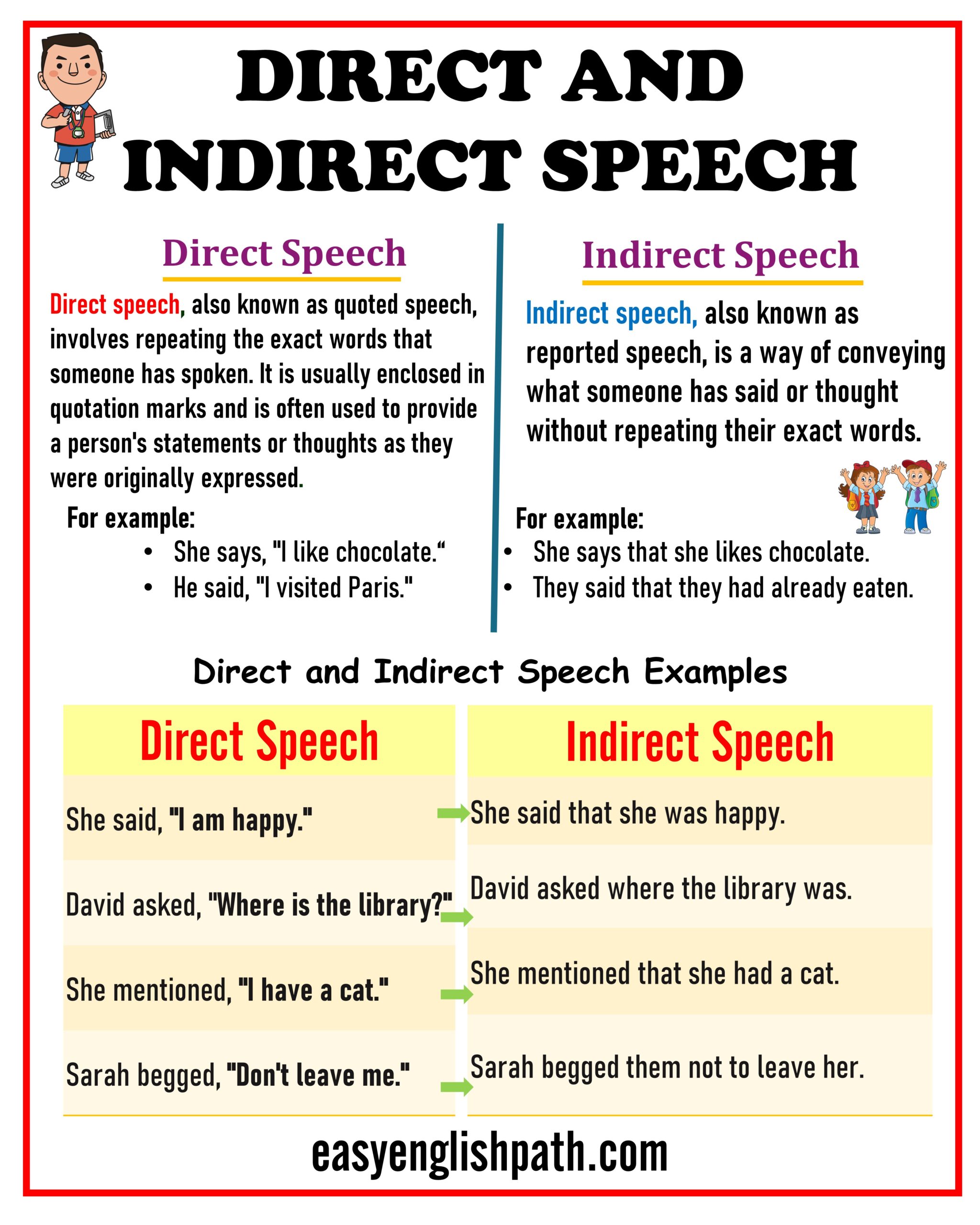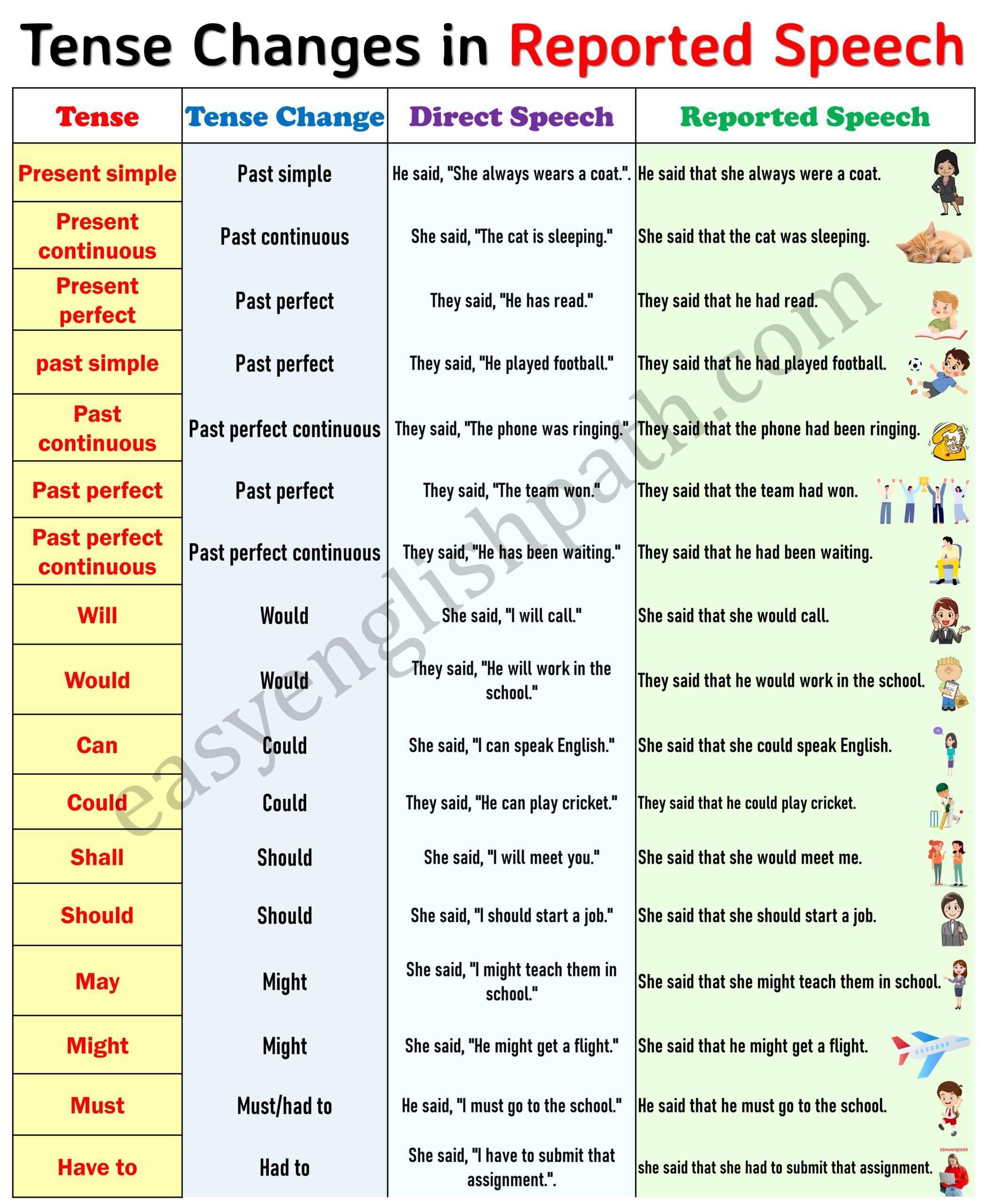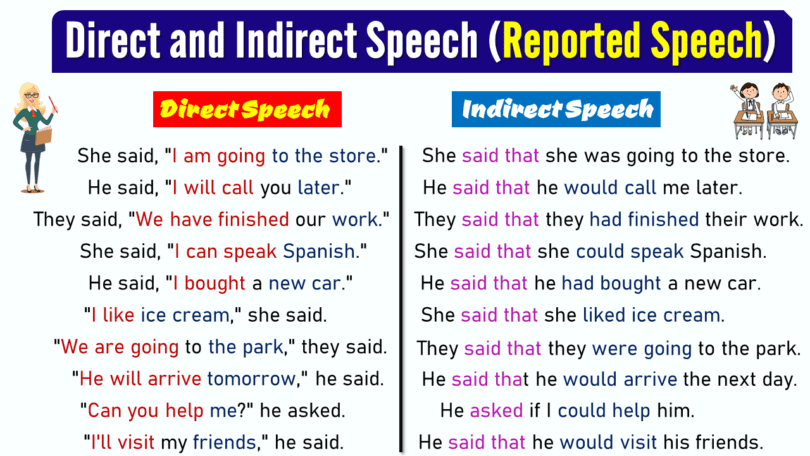Learning about Direct and Indirect Speech is like understanding how to share what someone said. Direct Speech is when you repeat exactly what someone said using quotation marks. Indirect Speech is when you tell what was said in your own words without using quotation marks.
When changing from Direct Speech to Indirect Speech, you might need to adjust verb tenses and pronouns to make sense. We’ll go through examples and situations to make it easier to understand. Let’s discuss more about Direct and Indirect Speech.

What is Direct Speech?
Direct speech, is also know as quoted speech, it involves repeating the exact words that someone has spoken. It is usually covered in quotation marks and is often used to provide a person’s statements or thoughts as they were originally expressed.
- She said, “I will be there at 3 o’clock.”
- Sarah exclaimed, “I can’t believe we won the competition!”
- “Please pass me the salt,” said John to his sister.
What is Reported Speech?
Indirect speech, also called reported speech, conveys what someone said without quoting their exact words. It typically uses verbs like “said,” “told,” or “asked” and requires changes in tense, pronouns, and other elements to fit the reporting context.
- Direct Speech: Sarah said, “I am going to the store.”
- Indirect Speech: Sarah said that she was going to the store.
- Direct Speech: “I love chocolate,” exclaimed Tom.
- Indirect Speech: Tom exclaimed that he loved chocolate.
Key Rules for Direct Speech
1. Use Quotation Marks Correctly
Enclose the exact spoken words within double quotation marks to indicate direct speech. The opening quotation mark comes before the first word, and the closing quotation mark follows the final punctuation.
- She said, “I will be there on time.”
2. Punctuation Rules in Direct Speech
You need to place punctuation marks (commas, periods, question marks, and exclamation points) inside the closing quotation mark when they are part of the quoted material.
- She said, “I’ll be there on time.”
3. Capitalization in Direct Speech
Begin the quoted speech with a capital letter, even if the original sentence starts differently.
- He said, “the weather is nice today.” ❌
He said, “The weather is nice today.” ✅
4. Use of Reporting Verbs
You need to introduce the quoted speech with a reporting verb (e.g., said, asked, replied, shouted) that describes how the words were spoken.
Example:
She said, “I am feeling great today.”
He asked, “Did you complete the assignment?”
They shouted, “Watch out!”
5. Maintain the Exact Words of the Speaker
You are supposed to produce the speaker’s words again as correctly as possible, including any grammatical errors or informal language if they are part of the original speech.
- She said, “I ain’t got no time for this.”
- He said, “Gonna meet you later.”
6. Using Ellipsis (…) for Omissions
If you need to exclude a part of the quoted speech, use an ellipsis (three dots: …) to indicate the omission.
- She said, “I wanted to go to the party, but… I changed my mind.”
- He said, “I remember that day so clearly… it was unforgettable.”
- They said, “We were planning to visit Paris, Rome, Madrid… and many more places.”
7. Keeping the Same Verb Tenses & Pronouns
Do not change the speaker’s words in a way that alters their meaning. However, you may add clarifications in brackets if needed.
- Maintain verb tenses as spoken. I am going remains I am going, not was going.
- Keep pronouns unchanged as in the original statement. I will do it stays I will do it, not he would do it.
Key Rules for Indirect Speech
1. Reporting Verb
You have to start the reported speech with an appropriate reporting verb (e.g., said, told, asked, explained, etc.) to indicate that someone is reporting what was said.
- He said that he was tired.
- She explained that she had missed the bus.
- They told us that the event was postponed.
2. Change of Pronouns
Change the pronouns in the reported speech to match the point of the reporting sentence. if the original statement is I am happy, and you want to report it, you might say, She said she was happy.”
- Direct: I am happy. → Reported: She said she was happy.
- Direct: We will join you. → Reported: They said they would join us.
- Direct: My car is new. → Reported: He said his car was new.
3. Tense Changes in Reported Speech
You should adjust the verb tenses to show the change in time from the original statement to the reported speech. The general rules for tense changes are as follows:
| Tense | Direct Speech | Reported Speech |
|---|---|---|
| Present Simple | “I like coffee.” | She said she liked coffee. |
| Present Continuous | “I am watching TV.” | He said he was watching TV. |
| Present Perfect | “I have seen that movie.” | They said they had seen that movie. |
| Past Simple | “I went to the store.” | She said she had gone to the store. |
4. Changes in Time and Place References
You can change any words or expressions that are used to refer to time or place to show the view of the reporting sentence.
- change today, to –> that day or here, to –>here
5. Modal Verbs
When you want to use modal verbs in reported speech, you should change them as follows:
| Modal | Direct Speech | Reported Speech |
|---|---|---|
| can | “I can do it.” | He said he could do it. |
| may | “I may go later.” | She said she might go later. |
| must | “You must finish.” | They said you had to finish. |
| will | “I will help.” | She said she would help. |
| shall | “Shall I come?” | He asked if he should come. |
6. Reporting Questions & Imperatives
When you want to report questions, use the word if or whether in order to introduce the reported question. You should change the word order and use the appropriate question word if necessary.
- Are you coming? becomes She asked if I was coming
We can use report imperative sentences using the verb to or that.
Close the door becomes She told me to close the door or She said that I should close the door.
7. Punctuation in Reported Speech
You should use a comma to separate the reporting verb from the reported speech. Also, use a period at the end of the reported speech or a question mark if it was originally a question.
- She said, “I will be there soon.”
- He asked, “Are you coming to the party?”
- They replied, “We have already left.”
8. Tense Changes in Reported Speech
Tense changes in reported speech, or indirect speech, are a key aspect of English grammar. In this process, verb tenses shift when reporting someone’s words. The key is to understand the relationship between the original statement and its reported version.
| Direct Speech | Reported Speech | Tense |
|---|---|---|
| She says, “I like chocolate.” | She says that she likes chocolate. | Present Simple |
| He said, “I visited Paris.” | He said that he visited Paris. | Past Simple |
| They say, “We are working on a project.” | They say that they are working on a project. | Present Continuous |
| She said, “I was studying all night.” | She said that she had been studying all night. | Past Continuous |
| He says, “I have finished my homework.” | He says that he has finished his homework. | Present Perfect |
| They said, “We had already eaten.” | They said that they had already eaten. | Past Perfect |
| She says, “I will meet you tomorrow.” | She says that she will meet you tomorrow. | Future (will) |
| He said, “I am going to travel next week.” | He said that he is going to travel next week. | Future (going to) |

Exceptions in Reported Speech
| Exception | Direct Speech | Indirect Speech | Reason |
|---|---|---|---|
| Universal Truths & Facts | “The Earth orbits the Sun.” | He said the Earth orbits the Sun. | Facts remain unchanged. |
| Present Habitual Actions | “She always wakes up at 6 AM.” | He said she always wakes up at 6 AM. | Routine stays the same. |
| Unchanged Future Plans | “The meeting will be on Monday.” | He said the meeting will be on Monday. | Fixed plans do not shift in tense. |
| Past Events That Stay the Same | “World War II ended in 1945.” | She said World War II ended in 1945. | Historical facts don’t change. |
| Modal Verbs (should, might, could, ought to, must for necessity) | “You must submit the form.” | He said I must submit the form. | Some modals remain unchanged. |
Direct and Indirect Speech Examples
- Direct Speech: She said, “I am happy.”
- Indirect Speech: She said that she was happy.
- Direct Speech: He asked, “How old are you?”
- Indirect Speech: He asked her how old she was.
- Direct Speech: Mary exclaimed, “I won a prize!”
- Indirect Speech: Mary exclaimed that she had won a prize.
- Direct Speech: John told his friend, “I like ice cream.”
- Indirect Speech: John told his friend that he liked ice cream.
- Direct Speech: They shouted, “Let’s go to the park!”
- Indirect Speech: They shouted to go to the park.
- Direct Speech: Sarah whispered, “I need help.”
- Indirect Speech: Sarah whispered that she needed help.
FAQs on Direct and Indirect Speech
1. What is the main difference between direct and indirect speech?
Direct speech quotes the exact words spoken: She said, “I am happy.”
Indirect speech reports the statement without quoting directly: She said she was happy.
2. How do verb tenses change in indirect speech?
Present simple → Past simple (“I like coffee.” → She said she liked coffee.)
Past simple → Past perfect (“I went home.” → He said he had gone home.)
3. Do pronouns always change in reported speech?
Yes, pronouns change to reflect the perspective of the reporting speaker.
Example: “I love this book.” → She said she loved that book.
4. How are questions reported in indirect speech?
Use if or whether for yes/no questions: “Do you like pizza?” → He asked if I liked pizza.
Keep question words but change structure: “Where are you going?” → She asked where I was going.
5. Are modal verbs changed in indirect speech?
Some modals change:
can → could (“I can swim.” → He said he could swim.)
will → would (“She will help.” → He said she would help.)
You May Also Like





